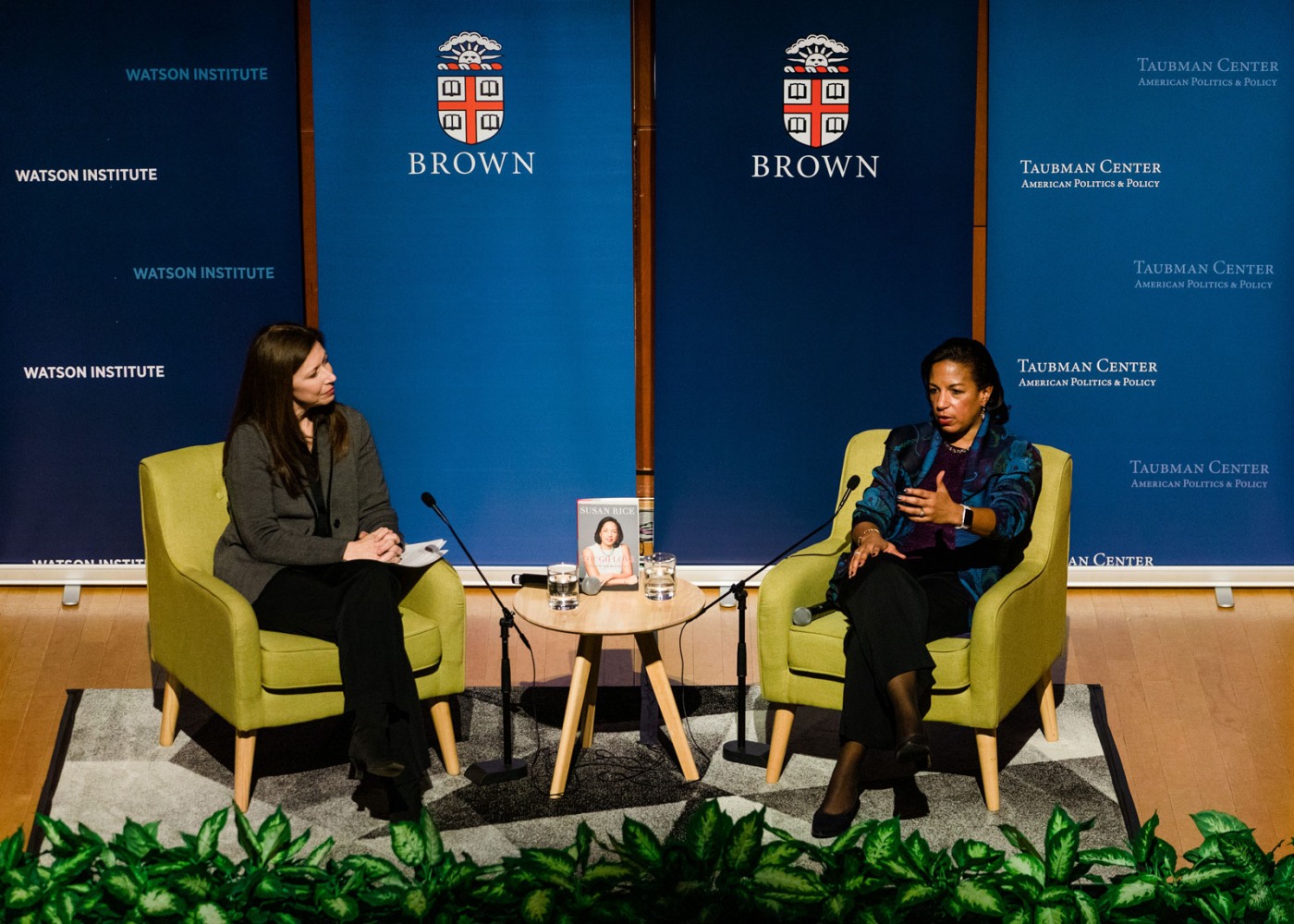PROVIDENCE, R.I. [Brown University] — Susan Rice thinks of her dinner table as a microcosm of the nation.
“I’m not sure what we fed our kids growing up,” the former national security advisor joked to a capacity crowd at Brown University on Wednesday, Nov. 6. “We have our son — until recently the loud and proud president of the Stanford College Republicans — and our daughter, who is considerably to the left of me and my husband. Mostly we just sit at the table, shaking our heads and trying to keep food from flying.”
Rice acknowledged that the divide can be tricky and at times uncomfortable to navigate. Yet the shared values she and her family members have in common — love, history and ambitions — far outweigh any differences in politics or policy, she maintained.
“It’s understanding that we have more that binds us than divides us that we can cling to, and that makes us strong,” Rice said. “We have decided what matters most. That’s essentially the choice we have to make as a nation.”

Rice’s visit to Brown was hosted by the Taubman Center for American Politics and Policy as part of its Governor Frank Licht ’38 Lecture series. In a discussion moderated by Taubman Center director Susan Moffitt, Rice recalled pivotal moments from her storied career in diplomacy — in addition to advising Barack Obama on national security, she served as U.S. ambassador to the United Nations — and shared insights into the way her personal life intermingles with policymaking, a key theme in her new memoir, “Tough Love: My Story of the Things Worth Fighting For.”
Whether it was her upbringing in Washington, D.C., during a politically fraught era, her early leadership as a young woman of color in the Clinton administration or her wide-ranging successes and failures navigating crises like the 2012 Benghazi attack and 2014 Ebola outbreak, Rice said some of the most critical milestones of her life have been defined by tough love.
“To me, it means loving fiercely but not uncritically,” Rice said. “It’s how I was raised, and frankly, it’s how I’ve tried to serve my country. I love this country deeply, but we’re imperfect, and we can do better and we must do better.”
After all, she said, organizations and communities are no more than collections of people, and people make mistakes. But tough love doesn’t mean simply being able to criticize the work of others. It means accountability, Rice said, especially when she feels like she’s the one who slipped up.
“As a leader, I try very hard to be willing to acknowledge our collective mistakes, and my individual mistakes, and to ask and expect that the people around me be willing and bold enough to give me their honest feedback,” she said.
Rice earned the position of assistant secretary of state for African affairs when she was just 32. In charge of managing diplomatic matters in the 48 countries of Sub-Saharan Africa while simultaneously parenting a three-month-old, she recalled breastfeeding in the State Department and feeling distinctly out of place. The officials who reported directly to her were often 20 to 30 years her senior, often white and often male.
While she didn’t lack ability or confidence, Rice said, she did lack experience and humility.
“I had to figure out through success and failure in fits and starts what was working and what was not,” Rice said. “Learning from mistakes is absolutely critical, and not being afraid to fail is critical. I think the biggest pitfall of policymaking is being unwilling to take risks. Being super, super cautious because you’re afraid to fail can lead to a degree of complacency that is another form of failure.”
Pointing to increasing political polarization across the nation, Rice believes that now is the time for strong, significant and even risky policy.
For her, that policy is mandatory civil service — a rule that all citizens between the ages of 18 and 22 must complete six to 12 months of service to the country, whether through military service, building infrastructure for high-speed broadband networks or working on environmental restoration.
In addition to serving the country, people would, through required service, gain the experience of working with others from different backgrounds — a move which Rice believes can help bridge political divides and quiet increasing polarization.
“People from vastly different backgrounds, vastly different corners of the country, vastly different ideological perspectives and vastly different socioeconomic circumstances have to live together, work together and cooperate on things of mutual benefit,” she said. “In my experience, it’s really hard to hate somebody when you know them well.”
The conversation was informed in part by questions Rice addressed that were submitted by Brown students that ranged from truth in political advertising, foreign interference in U.S. elections and the threat of domestic terrorism.
Returning to the idea of connecting over shared values rather than dividing over perceived differences, Rice stressed the need for America to forge strong relationships with its allies. Because we don’t live in a zero-sum world, challenges can only be addressed effectively in partnership, she said.
“Call me old school, but I’m of the view that our national interests are advanced when we’re able to cooperate with others,” she said.
Although this political period can seem bleak, Rice urged the audience to recall America’s strengths of collaboration and its ability to rebound. She mentioned periods in history that were far bloodier, far more polarizing and far more unstable — all of which the country emerged from “arguably stronger, and certainly more unitary.”
America can get through this, she said.
“Thus far, nobody has ever won by betting against the United States’ long-term capacity to grow and heal and renew itself, and I believe it would be foolish to start now.”